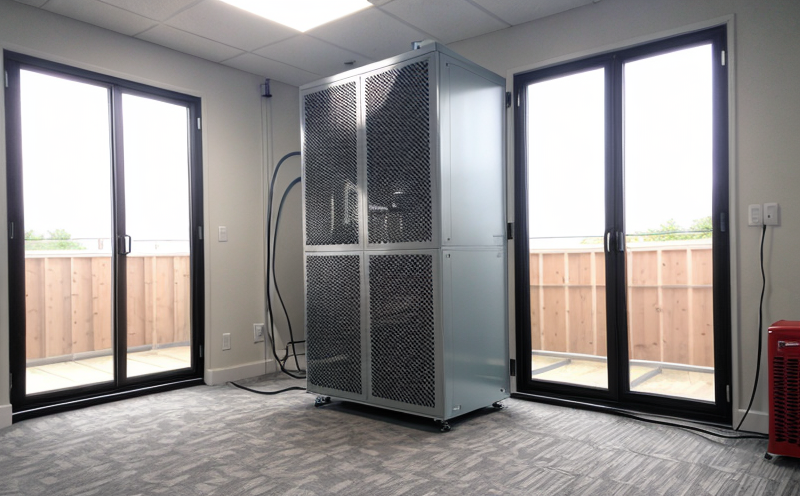Fan Coil Unit Airflow Test
In HVAC equipment testing, fan coil units (FCUs) are critical components that play a pivotal role in maintaining optimal indoor air quality and comfort. These systems circulate conditioned air through ductwork to various zones within a building. Testing the airflow of FCUs is essential to ensure they meet design specifications and operational efficiency standards.
For quality managers, compliance officers, R&D engineers, and procurement professionals, understanding the intricacies of fan coil unit airflow testing can significantly impact product performance and overall HVAC system reliability. This service ensures that the units are functioning as intended under various conditions, which is crucial for maintaining a comfortable environment while adhering to energy efficiency standards.
The test involves measuring the volumetric flow rate of air through the FCU at specified operating points. This measurement helps in validating that the unit delivers the required airflow as per its design parameters. The testing process typically includes setting up the unit under controlled conditions, calibrating the instruments, and recording precise measurements.
Adhering to international standards such as ISO 14038:2017 is crucial for ensuring accurate results. This standard provides guidelines on the measurement of air volume flow rates in HVAC systems. The testing setup may include a calibrated anemometer, temperature sensors, and pressure gauges to monitor airflow, temperature, and pressure variations.
During the test, it is essential to consider factors like fan speed settings, outdoor/return air temperatures, and humidity levels. These variables can significantly affect the performance of the FCU. By varying these parameters during testing, we can evaluate how well the unit responds under different operational conditions. This comprehensive approach ensures that the FCUs are optimized for both efficiency and comfort.
Once the test is completed, detailed reports are generated, highlighting the measured airflow values along with any deviations from the expected design specifications. These reports serve as critical documentation for compliance officers and R&D engineers, providing insights into potential areas of improvement or recalibration needs.
| Parameter | Description |
|---|---|
| Fan Speed Settings | Varying fan speeds to test performance at different operating points. |
| Outdoor/Return Air Temperatures | Adjusting temperatures to simulate real-world conditions. |
| Humidity Levels | Incorporating varying humidity levels to assess the unit's performance under diverse environmental conditions. |
Industry Applications
- Commercial buildings, where FCUs are integral for maintaining climate control and energy efficiency.
- Residential settings, ensuring that individual zones receive adequate airflow for comfort and health.
- Facilities with strict environmental requirements, such as hospitals or laboratories, where precise temperature and humidity control is essential.
The fan coil unit airflow test plays a vital role in various sectors. In commercial real estate, it ensures that tenants receive the expected level of comfort without compromising on energy costs. For residential developers, this service helps in delivering high-quality HVAC systems to homeowners. In healthcare facilities, accurate testing is crucial for maintaining safe and comfortable environments.
| Condition | Description |
|---|---|
| Cold Weather Test | Testing under low outdoor temperatures to ensure the FCU can maintain a consistent indoor climate. |
| Hot Weather Test | Evaluating performance in high-temperature conditions, especially relevant for tropical and subtropical regions. |
Customer Impact and Satisfaction
The Fan Coil Unit Airflow Test is not just a technical procedure; it has tangible benefits that enhance customer satisfaction across various sectors. For quality managers, this service ensures product reliability and compliance with industry standards, which ultimately leads to higher customer trust.
Compliance officers benefit from the clear documentation provided by these tests, ensuring that all HVAC systems meet regulatory requirements. R&D engineers gain valuable insights into performance metrics, which can drive innovation and product improvement. Procurement professionals can rely on this service for accurate specifications during the vendor selection process.
The results of the airflow test are often used to make informed decisions about system upgrades or replacements. This proactive approach helps in reducing energy costs while enhancing overall comfort levels. By ensuring that FCUs perform optimally, we contribute significantly to the satisfaction and well-being of end-users across different sectors.
Use Cases and Application Examples
- In a commercial office setting, testing ensures that each cubicle or office area receives adequate airflow for comfort and health.
- In residential settings, the test helps in identifying any discrepancies between design and actual performance, ensuring consistent temperature control.
- For healthcare facilities, accurate testing is crucial to maintain a safe and comfortable environment, especially during peak occupancy periods.
The Fan Coil Unit Airflow Test can also be applied in industrial settings where controlled environments are necessary for process stability. In data centers, ensuring optimal airflow is critical for maintaining equipment performance while minimizing energy consumption.





